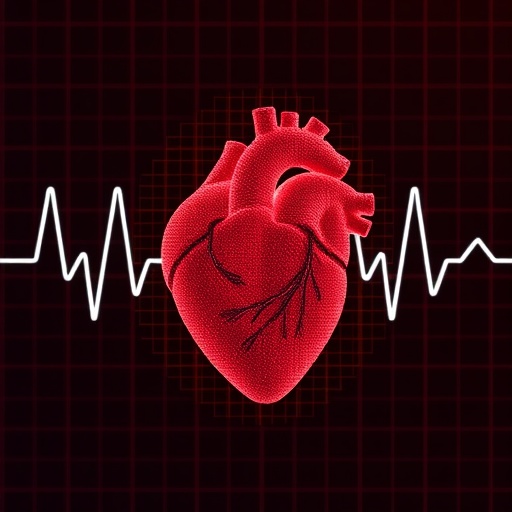Across the globe, healthcare systems are navigating the complexities of diagnosing and managing heart failure, a leading cause of morbidity and mortality. Recent advances in technology have opened new avenues for risk stratification in patients at risk of developing heart failure. A groundbreaking study utilizing an artificial intelligence (AI)-adapted electrocardiogram (ECG) model has emerged, highlighting its potential to transform how heart failure risk is assessed. This innovative approach leverages the widely available lead I ECGs to estimate heart failure risk in diverse multinational cohorts.
The research underscores a crucial intersection of healthcare and technology, establishing a framework for future studies involving wearable devices. These portable ECG devices are increasingly becoming integral to personal health monitoring, making the study’s findings both timely and significant. The AI model utilized in the research is designed to adapt and learn from varying noise levels typically associated with ECG data, a common issue that has historically hampered the accuracy of clinical assessments.
One of the study’s fascinating aspects is its emphasis on real-world applicability. By employing lead I ECGs, which are easier to use in non-clinical settings than traditional 12-lead systems, the model proposes that individuals can continuously monitor their heart health with devices readily available on the market. This capacity for ongoing monitoring significantly enhances the prospects for early detection and intervention in heart failure cases, ultimately leading to improved patient outcomes.
The implications of this study extend beyond mere diagnostic capabilities; it also suggests a paradigm shift toward personalized medicine. By employing AI for risk evaluation, clinicians may tailor preventative strategies and treatment regimens to individual patient profiles. This model’s proactive stance could shift the management of cardiovascular diseases from reactive to preventive, thereby alleviating the burden on healthcare systems worldwide.
Dr. Rohan Khera, the corresponding author of the study, emphasizes the necessity for further exploration in a prospective study setting. As promising as the findings are, he notes that extensive validation through real-world applications is essential before incorporating such AI-driven assessments into routine clinical practice. The rapid pace of technological advancement necessitates continued research, especially as we explore the ethical, practical, and clinical implications of integrating AI into everyday healthcare.
In this prospective study setting, wearable ECG devices could play a pivotal role in the future of heart health monitoring. The ability to gather real-time data significantly augments the traditional model of intermittent check-ups and provides a more comprehensive picture of an individual’s cardiovascular status. Importantly, the study highlights that these wearable devices are not merely consumer gadgets but may evolve into essential components of preventive cardiology.
Furthermore, the potential to analyze vast datasets garnered from these devices allows for more robust AI training. The model’s adaptability to various data inputs, including noise, positions it as a frontrunner in cardiovascular predictive analytics. This adaptability can enhance its reliability, making it a favorable option in diverse patient populations, particularly in low-resource settings where access to extensive clinical evaluations may be limited.
The study’s focus on heart failure is particularly critical, considering the escalating rates of cardiovascular diseases globally. Effective management and early detection of heart failure can significantly curb progression to severe disease stages, reducing hospitalization rates and associated healthcare costs. Notably, the escalating prevalence of heart failure underscores the urgency for innovative strategies, making this AI-ECG model a compelling contender in the future of cardiology.
In addition to its health implications, this study may catalyze further interest in the convergence of technology and medicine. As more researchers explore AI’s capabilities in diagnosing other medical conditions, the healthcare industry could witness a transformational shift in how various diseases are assessed and managed. The ongoing collaboration between tech developers and healthcare professionals could yield groundbreaking innovations that enhance patient care delivery.
As the medical community continues to embrace AI in healthcare applications, educating practitioners becomes paramount. Each new advancement must come with thorough training for healthcare providers to ensure effective implementation and patient safety. The robust nature of the AI-ECG model necessitates an understanding of its intricacies, including the handling of noise in data inputs and interpreting AI-generated risk scores.
In summary, this study has opened new avenues for heart failure risk stratification, indicating a significant step forward in patient-centered care. The potential to leverage wearable devices anchored by advanced AI models could reshape the healthcare landscape, fostering a proactive approach to managing cardiovascular health. The future holds promise, and as research endeavors continue, the integration of these technologies may lead to optimally tailored interventions for individuals at varying risk levels of heart failure.
The need for further studies and collaborations among stakeholders in this domain cannot be overstated, especially as acceptance of AI in clinical practice transitions from skepticism to standardization. As advancements unfold, a collective commitment to ethical standards and patient safety must guide the application of AI technologies in healthcare. The quest for knowledge, driven by a desire to understand better and mitigate health risks, remains the cornerstone of advancing healthcare solutions.
Effective communication about such studies, including their implications and future prospects, is essential to bridging the gap between theory and practice. As the scientific community analyzes these findings, engaging in robust discussions regarding their applicability, methodologies, effectiveness, and potential challenges ensures that the transition to AI-driven tasks will benefit from collective insights and expertise.
Through this lens, the study sheds light on a monumental shift in cardiovascular health assessment, further emphasizing the need for a holistic approach. As wearable technology garners traction in modern medicine, we may soon see the dawn of a new era in heart health that combines advanced technology with data science, ultimately aiming for optimized, personalized patient care in the realm of cardiology.
Subject of Research: Heart failure risk stratification using AI-adapted ECG models
Article Title: AI-Enhanced ECG Models for Heart Failure Risk Assessment: Revolutionizing Healthcare
News Publication Date: October 2023
Web References: www.jamacardio.com
References: doi:10.1001/jamacardio.2025.0492
Image Credits: JAMA Cardiology
Keywords
Heart failure, Artificial intelligence, Cohort studies, Wearable devices, Electrocardiography, Cardiology, Heart, Noise control, Risk management.




